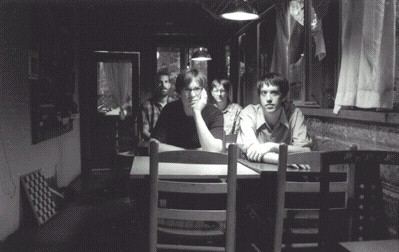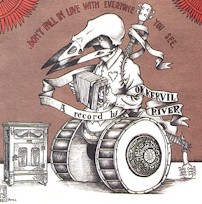|

Down
by Okkervil River
story by tim mcmahan
| |
|
Lazy-i: Feb. 27, 2002
|
March 5
Okkervil River w/ Watch the Stereo
The Junction,
15th & Farnam
Omaha
8 p.m.
$5
18+ | |
|
There are three
reasons why people decide to write about music. The
first is for the free CDs -- that's the easy one. The second is the rather haughty
and self-congratulatory reason of turning people onto music they would never have
known about without you. It's a ridiculous reason, especially when you realize
there aren't that many readers out there. What's
the third reason? I never
heard of the Austin, Texas, band Okkervil River before they got booked for their
March 5 show at The Junction. I saw their name on a schedule of upcoming shows
and hadn't paid it a thought, other than "What a weird name for a band."
Out of the blue I received a copy of Don't Fall in Love with Everyone You See
in the mail from Okkervil River's record label, Jagjaguwar, and set it aside,
meaning to get around to playing it. Then one Sunday morning (the most appropriate
time to listen to this band) I gave the CD a spin. Then listened to it again.
Then played it for a friend of mine, saying, "I never would have heard of
these guys if it wasn't for this job. This is the reason why I write about music."
That's the third reason, actually. Don't
Fall in Love with Everyone You See is an amazingly beautiful CD. The band's
one-sheet mentions Tindersticks, Arab Strap and Bright Eyes. I'm reminded of Simon
Joyner, Counting Crows and, dare I say it, Will Oldham. "We
get compared to him a lot," said Okkervil River's primary songwriter and
guitarist Will Robinson Sheff about the legendary mope-folky who headed Palace
and now performs as Bonny Prince Billie. "When our first record came out,
we were compared to Will Oldham savagely. That actually hurt my feelings. I'm
not trying to do a Will Oldham impression." The
Will Oldham comparison isn't fair, really. Okkervil River is better than that,
catchier than Oldham on his best day.
|
| |
Their
music is rural and slightly southern, more backwater than wheat field, with a
nod toward slow bluegrass and dustbowl folk. Sheff, who says he doesn't like the
term "alt-country" or the bands that play it, confesses a love for old-time
Appalachian music. "I love old folk," he said about his influences,
but then quickly added, "I love first-generation singer-songwriters like
Bob Dylan, Leonard Cohen and Joni Mitchell. I love Neutral Milk Hotel -- Jeff
Mangum is one of today's best living musicians." And
yeah, he likes Will Oldham, who was one of the first modern indie-style folk singers
he'd heard after leaving for college. "When I first heard him, it sounded
like he was singing right to me. It blew me away." Sheff said. When
he met mandolin, electric/string bass player Zach Thomas and drummer/percussionist
Seth Warren in high school at tiny Meredith, New Hampshire, Sheff said the three
shared a love for old American folk. "Roscoe Holcomb, Skip James, Leadbelly,
the Carter Family, Doc Watson, The Stanley Brothers. I love that music. It's always
really spoken to me because I grew up in a small town where nature was a real
controlling presence." After
going their separate ways after high school -- each attending a different college
-- the three wound up back together in Austin in 1998 when they formed Okkervil
River. A year later they recorded and self-released their first CD as a trio --
a stripped-down, rather dark effort called Stars Too Small to Live. After
touring, the band spent a year in the studio with producer Brian Beattie, who
has worked with Dead Milkmen, Glass Eye and had just come off producing Austin
legend Daniel Johnston's last album. Sounds like an expensive endeavor for a band
whose lead singer makes a living writing for web outfit Audio Galaxy, while
the other members work in a book store and write computer code. "Brian doesn't
charge you by the hour," Sheff said. "You pay him a certain amount up
front and he becomes a new member of the band. He's a family man, which means
he doesn't bend around the band's schedule, you bend around his." Sheff
told Beattie he was after something completely different than the band's austere
debut. "I didn't
want it to be stark," he said. "I told Brian I wanted the new CD to
sound like soul, like an Al Green record. I really liked the very orchestrated,
atmospheric bands like Tindersticks, but for our first record, there was only
the three of us. We expanded our sound this time by adding whatever instruments
we knew how to play and by pulling in people we liked from around Austin." Thirteen
additional players, including the multi-instrumentalist Beattie, contributed horns,
strings, pedal steel and banjo. In addition, Jonathan Meiburg became the band's
fourth permanent member, adding Wurlitzer and accordion to the mix.
|

| "When
our first record came out, we were compared to Will Oldham savagely. That actually
hurt my feelings." | |
|
| 
| "I
remember my co-workers looking at him and looking at him for the evil on his face.
You wanted to see the evil, but it wasn't there."
| |
|
Lyrically,
Sheff also had something different in mind. "The last album dwelt on sadness,"
he said. "I wanted this one to be about love." Unlike
so many of today's indie artists whose lyrics are almost purposely vague, Sheff's
lyrics are like documentary-style poetry, telling perfect little stories that
deal with longing and loss, fear and coping, hope and regret, even mourning the
loss of a family dog. The details are vivid, too vivid to be made up. "The
songs are all connected to things happening in my life," Sheff said, "but
they're not biographical. I like to mess with the perspective. The more personal
the song, the more likely I'll fictionalize it. I listened to a lot of Elvis Costello
and like a well-shaped and composed song. I try to exercise control over it. I'm
obsessed with this idea of being just poetic enough. I don't listen to rock to
hear great poetry. I want the lyrics to seem real to me." The
album opens with the warm, Tindersticks-like "Red," a song about a lonely
dancer separated from her child, with the line, "I know I don't deserve
/ Supervised sight of her / But each day becomes a blur / Without my daughter."
The haunting mandolin-driven
murder story "Westfall" is as brutal as a Johnny Cash song with melody
by way of Harvest-era Neil Young. Sheff said he wrote it around the lyric,
"They're looking for evil / Thinking they can trace it / But evil don't
look like anything." "There
were these murder cases in Austin where these two girls were working in a yogart
shop and these three college guys went to rob the place and killed and mutilated
them," Sheff said. "I worked for the state at the time and heard the
details they didn't report -- how they cut them open and filled them with frozen
yogart. They caught one of the kids that did it, and there he was, on TV, and
I remember my co-workers looking at him and looking at him for the evil on his
face. You wanted to see the evil, but it wasn't there." "Dead
Dog Song" is the most autobiographic track on the album. It's about Sheff
scattering his dog's ashes among the skein of trees where the hound used to run,
and opens with scattering trap brushes and a mandolin that sounds like a dog bounding
through a forest, in and out of the light and shadow, jumping around the trees.
It has the feel of a bluegrass holler, with the whooped-up line "Oh, It's
all over / He's never coming back / There's no more roaming / He was only here
/ Fourteen years / And now the branches scratch my face / And I can't hold back
the tears." Throughout
the CD's nine tracks, touches of horns, accordion, cello and violin blend seamlessly
with the band's simple acoustic accompaniment, pulling everything together like
kudzu covering a deep forest. Sheff and company will have their work cut out for
them reproducing the sound with their four core members, including new drummer
Mark Pedini. Though the
CD just came out Jan. 22, Sheff says the band is ready to record the next one
this August. "We've been living with the songs on Don't Fall in Love…
for a year and a half," he said. "We'll be playing some of the new stuff
on the tour." After
this mini-tour that takes the band through the Midwest, Okkervil River will head
out for three weeks of dates along the Northwest, then spend two weeks touring
the West Coast, before they return to Austin and their day jobs. "I
don't want to get famous," Sheff said. "It would be really nice to have
enough money that I didn't have to work at anything but music, enough money to
buy organic groceries. Right now I can record, I have a label to put out my music
and a guy booking our tour. What more do you need to be able to play your music?"
Back to  Published
in The Omaha Weekly Feb. 27, 2002. Copyright © 2002 Tim McMahan. All rights reserved.
| | | | | |
|

![]() webboard
interviews
webboard
interviews